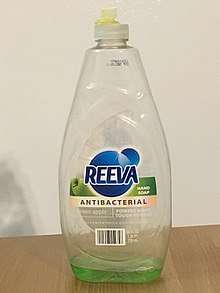Antibacterial soap
Antibacterial soap is a soap which contains chemical ingredients that purportedly assist in killing bacteria.[1] The majority of antibacterial soaps contain triclosan, though other chemical additives are also common.[2] The effectiveness of products branded as being antibacterial has been disputed by some academics as well as the U.S. Food and Drug Administration (FDA).[3]

History
Triclosan and other antibacterial agents have long been used in commercial cleaning products for hospitals and other healthcare settings, however they began to be used in home cleaning products during the 1990s.[3]
Ingredients
Triclosan and triclocarban are the most common compounds used as antibacterials in soaps.[4] However, other common antibacterial ingredients in soaps include benzalkonium chloride, benzethonium chloride, and chloroxylenol.[5]
Effectiveness
Claims that antibacterial soap is effective stem from the long-standing knowledge that triclosan can inhibit the growth of various bacteria, as well as some viruses and fungi.[2] However, more recent reviews have suggested that antibacterial soaps are no better than regular soaps at preventing illness or reducing bacteria on the hands of users.[2][6]
In September 2016, the U.S. Food and Drug Administration banned the use of the common antibacterial ingredients triclosan and triclocarban, and 17 other ingredients frequently used in "antibacterial" soaps and washes, due to insufficient information on the long-term health effects of their use and a lack of evidence on their effectiveness. The FDA stated "There is no data demonstrating that over-the-counter antibacterial soaps are better at preventing illness than washing with plain soap and water".[5] The agency also asserted that despite requests for such information, the FDA did not receive sufficient data from manufacturers on the long-term health effects of these chemicals. This ban does not apply to hand sanitizer.[4]
A 2017 statement by 200 scientists and medics published in the scientific journal Environmental Health Perspectives warns that anti-bacterial soaps and gels are useless and may cause harm. The statement also cautioned against the use of antimicrobial agents in food storage containers, exercise mats and paints.[7] British firm Unilever claimed in 2017 to be phasing triclosan and triclocarban out of their products by the end of the year, adding they would be replaced by “a range of alternatives, including natural and nature-inspired antibacterial ingredients”. A lot of companies have already started using natural ingredients in their antibacterial products.[8]
References
- "FDA Taking Closer Look at 'Antibacterial' Soap". U.S. Food and Drug Administration. Retrieved 16 April 2016.
- Aiello AE, Larson EL, Levy SB (September 2007). "Consumer Antibacterial Soaps: Effective or Just Risky?" (PDF). Clinical Infectious Diseases. 45 (2): S137–47. doi:10.1086/519255.
- "Five Reasons Why You Should Probably Stop Using Antibacterial Soap". Smithonian Magazine. 3 January 2014. Retrieved 3 September 2016.
- "FDA bans common ingredients in antibacterial soaps and body washes". Washington Post. 2 September 2016. Retrieved 3 September 2016.
- Kodjak A (2 September 2016). "FDA Bans 19 Chemicals Used In Antibacterial Soaps". NPR. Retrieved 24 October 2017.
- "Antibacterial Soap? You Can Skip It, Use Plan Soap and Water". US FDA. Retrieved 24 October 2017.
- Donelly, Laura (25 June 2007). "Antibacterial soaps may do more harm than good, scientists warn". The Telegraph. Retrieved 24 March 2019.
- "Natural Antibacterial Soaps". Skin Seas. Retrieved 24 November 2019.